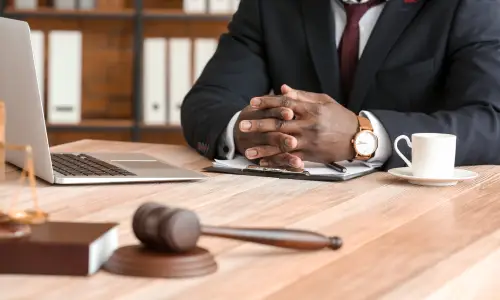
However, a relaxing day on the water can take a sudden turn if an accident occurs.
The surge in recreational boating nationwide paints a concerning picture. With millions more boats sharing our waterways than ever before, the risk of accidents has inevitably risen.
The U.S. Coast Guard reports over 8,600 boating accidents annually, resulting in tragic loss of life and serious injuries.
Collisions, propeller strikes, and incidents involving inexperienced personal watercraft operators are all too common. These accidents can leave victims with a multitude of physical, emotional, and financial burdens.
If you’ve been injured in a South Carolina boating accident, you don’t have to navigate the legal complexities and financial strain alone. The CEO Lawyer Personal Injury Law Firm is here to help you understand your rights and fight for the compensation you deserve.
Why You Need a South Carolina Boating Accident Attorney on Your Side
After a boating accident, your main focus should be on recovery. However, navigating the legal complexities of a personal injury claim can be daunting.
This is where a South Carolina boating accident lawyer from the CEO Lawyer Personal Injury Law Firm can step in and fight for your rights.
Here’s what our experienced legal team can do for you:
- Conduct a thorough investigation: We will meticulously investigate the accident scene, gather evidence, and identify all potentially liable parties.
- Determine liability: Our South Carolina personal injury lawyers will work tirelessly to establish who was responsible for the accident and ensure they are held accountable.
- Handle communication with insurance companies: Insurance companies are notorious for offering lowball settlements. We will negotiate aggressively on your behalf to secure the maximum compensation you deserve.
- Prepare a strong case: Our legal team will gather medical records, professional opinions, and other evidence to support your claim.
- Represent you in court, if necessary: While we strive for out-of-court settlements, we are fully prepared to take your case to court if needed.
We are dedicated to providing compassionate and aggressive legal representation to help you recover the compensation you need to move forward with your life. Schedule a free consultation today.
If you or a loved one has been injured in a South Carolina boating accident, don’t hesitate to contact the CEO Lawyer Personal Injury Law Firm. We offer a free consultation to discuss your case and answer any questions you may have.
There’s no obligation to hire us, but we’re confident you’ll be impressed by our experience and commitment to your success. Call us today at (864) 664-3865 or visit our website.
The Rise of Boating Accidents in South Carolina
Boating is a cherished pastime in South Carolina, with our beautiful coastline and numerous lakes and rivers offering ample opportunities to enjoy the water. However, as the popularity of boating has surged in recent years, so too has the number of boating accidents.
According to the 2023 Recreational Boating Statistics released by the U.S. Coast Guard, there are over 8,600 boating accidents annually, resulting in more than 900 deaths and nearly 4,500 serious injuries.
This increase in accidents can be attributed to several factors, including:
- Crowded waterways: With more boats vying for limited space, the risk of collisions and wake-related accidents rises.
- Operator inexperience: Inexperienced boaters may not be familiar with navigation rules or safety protocols, leading to dangerous situations.
- Alcohol and drug use: Operating a boat under the influence is just as dangerous as driving a car under the influence.
- Distracted operation: Just like with texting and driving, texting and boating can have disastrous consequences.
- Improper lookout: Not having a designated lookout to keep an eye out for hazards significantly increases the risk of accidents.
Types of Boating Accidents and Associated Dangers
Information from the U.S. Coast Guard Auxiliary highlights that many boating accidents stem from operator error, lack of training, and inattention, rather than collisions alone.
- Falls Overboard: This is the leading cause of death in boating accidents. Falling overboard can result in drowning, hypothermia, or injuries from impact with the water or nearby objects. Factors like rough waters, slippery surfaces, sudden movements of the boat, or intoxication can all increase the risk of falling overboard.
- Flooding and Swamping: These incidents occur when a boat takes on too much water, causing it to lose buoyancy and potentially capsize. Flooding and swamping can be caused by overloading the boat, encountering severe weather conditions, or mechanical failure.
- Collisions with Fixed Objects: Boats colliding with objects like rocks, piers, or bridges can cause serious injuries to those onboard. Operator inexperience, speeding, or navigating in unfamiliar waters can contribute to these accidents.
- Personal Watercraft Mishaps: Jet skis and other personal watercraft (PWCs) can be particularly dangerous in the hands of inexperienced operators. Sharp turns, collisions with other vessels, or reckless maneuvers can lead to serious injuries or fatalities.
- Collisions Between Boats: While less common than falls overboard, collisions between boats can cause significant damage and injuries. These accidents often stem from factors like operator inexperience, speeding, impaired driving, or failure to observe navigational rules.
These are just some of the most frequent types of boating accidents. It’s important to remember that regardless of the cause, life jackets are essential safety equipment.
An estimated 84% of all fatal boating accident victims were not wearing life jackets. Always wear a properly fitted life jacket when on the water.
Common Causes of Boating Accidents in South Carolina
South Carolina law mandates that boat operators exercise the highest degree of care and prudence while navigating waterways. When this duty of care is breached, it can lead to accidents and injuries.
Here are some of the most common causes of boating accidents in South Carolina:
- Boater Inexperience or Error: Operating a boat requires knowledge and skill. Inexperienced boaters may make errors in judgment, such as speeding, failing to maintain a proper lookout, or not understanding navigational rules.
- Adverse Weather Conditions: Boating in bad weather can be extremely dangerous. Strong winds, heavy rain, or fog can significantly reduce visibility and make it difficult to navigate safely. Boaters should always check weather forecasts before heading out and avoid the water if hazardous conditions are expected.
- Failure of Boating Equipment: Malfunctioning equipment can pose a serious threat to the water. Examples include faulty steering mechanisms, engine problems, or electrical issues. Regularly maintaining and inspecting your boat and its equipment is crucial for safety.
- Boating Under the Influence (BUI): Enjoying a day on the water shouldn’t come with a hidden risk. However, operating a boat under the influence of alcohol or drugs (BUI) is as dangerous as driving under the influence. Just like on the road, impaired judgment, reaction time, and coordination can have catastrophic consequences on the water.
The Aftermath of a Boating Accident – Physical, Emotional, and Financial Strain
Boating accidents shatter more than fiberglass. The physical consequences can range from minor bumps to life-altering injuries, leaving victims grappling with chronic pain, disability, and even the loss of a loved one.
The emotional toll is just as real, with anxiety, depression, and PTSD becoming unwelcome companions.
The financial strain can feel like an anchor, dragging victims underwater. Medical expenses, lost wages, and rehabilitation costs can cripple even the most prepared.
If the accident results in a permanent disability, the financial hardship can become a lifelong struggle.
Securing Compensation for Your Losses
Serious injuries, mounting medical bills, lost wages, and emotional distress can leave you feeling overwhelmed. If someone else’s negligence caused your boating accident, South Carolina law allows you to seek compensation for your losses through a personal injury lawsuit.
Medical Expenses and Related Costs
A boating accident can result in a wide range of injuries, some requiring extensive medical treatment. Recoverable medical expenses in your case may include:
- Emergency room treatment and hospitalization costs
- Doctor visits and consultations with medical providers
- Surgery and anesthesia costs
- Medications and physical therapy
- Rehabilitation and ongoing medical care
- Durable medical equipment (DME) such as wheelchairs, prosthetics, or braces
It’s crucial to keep all medical bills, receipts, and insurance statements related to your accident injuries. This documentation is essential for proving the extent of your medical expenses and the necessity of the care you received.
Lost Wages and Reduced Earning Capacity
A boating accident can significantly impact your ability to work and earn a living. You may be entitled to compensation for:
- Lost wages due to missed work days while recovering from injuries
- Reduced earning capacity if your injuries limit your ability to perform your previous job duties
- Lost income from self-employment or missed business opportunities
To document your lost wages, gather pay stubs, tax returns, and any documentation from your employer regarding missed work. An economist may also be necessary to calculate your future lost earning potential due to permanent disabilities.
Property Damage
If your boat or other personal property was damaged or destroyed in the accident, you can get compensation for repairs or replacement costs. Be sure to document the extent of the damage with photographs and repair estimates.
Miscellaneous Related Expenses
In addition to the above, you may recover compensation for other expenses directly related to your accident, such as:
- Transportation costs to and from medical appointments
- Home modifications necessary due to disabilities
- In-home care services if your injuries require assistance with daily living activities
- Childcare costs if you are unable to care for your children due to your injuries
Pain and Suffering Damages
Beyond the financial losses, you may also be entitled to compensation for the physical and emotional pain and suffering you’ve endured as a result of the accident. This can include:
- Pain and discomfort from your injuries
- Emotional distress, such as anxiety, depression, or post-traumatic stress disorder (PTSD)
- Loss of enjoyment of life due to limitations caused by your injuries
Wrongful Death Claims
If you tragically lost a loved one in a boating accident caused by someone else’s negligence, you can likely file a wrongful death lawsuit. This type of lawsuit seeks compensation for the damages suffered by the surviving family members.
Recoverable damages in a wrongful death claim may include:
- Medical expenses incurred before your loved one’s passing
- Funeral and burial costs
- Loss of the decedent’s future income and financial support
- Loss of companionship and guidance
- Loss of household services provided by the deceased
South Carolina Boating Accident Law Firm’s Frequently Asked Questions
If you’ve been injured in a South Carolina boating accident, you likely have many questions and concerns. Here are some frequently asked questions regarding South Carolina Boating Accident Law:
What Types of Boats Are Most Commonly Involved in Boating Accidents?
While any boat can be involved in an accident, statistics show that powerboats and personal watercraft (PWCs) are most frequently involved in boating accidents. Large commercial vessels and sailboats are less common but can also be involved in accidents.
What Kind of Injuries Can Occur in a Boating Accident?
Drowning is a significant risk in boating accidents. However, many other serious injuries can also occur, including:
- Head and brain injuries: These can range from mild concussions to life-threatening traumatic brain injuries (TBIs) due to impacts or falls overboard.
- Back and spinal cord injuries: Boating accidents can cause severe back injuries, herniated discs, or even spinal cord damage with paralysis.
- Broken bones: Fractures can occur due to collisions, falls, or being struck by objects.
- Amputations: Serious accidents involving boat propellers or machinery can result in limb amputations.
Any of these injuries can be life-threatening or cause permanent disabilities. If you or a loved one has suffered injuries in a boating accident, it’s crucial to seek medical attention immediately and then consult with a lawyer to understand your legal options.
What Damages Can I Recover in a South Carolina Boating Accident Lawsuit?
If you’ve been injured in a boating accident caused by someone else’s negligence, compensation for a variety of damages may include:
- Medical expenses: This includes past, present, and future medical costs associated with your injuries, such as hospital bills, doctor’s appointments, rehabilitation, medications, and assistive technology.
- Lost wages: If your injuries prevent you from working or require you to work fewer hours, you can recover compensation for lost income.
- Reduced earning capacity: In some cases, a boating accident can permanently impact your ability to earn a living. A lawsuit can help recover compensation for future lost wages.
- Pain and suffering: This includes compensation for the physical and emotional pain you have endured as a result of your injuries.
- Emotional distress: Boating accidents can cause anxiety, depression, and post-traumatic stress disorder (PTSD). You may be able to recover compensation for these emotional damages.
- Property damage: If your boat or other personal property was damaged or destroyed in the accident, compensation for repairs or replacement costs may be provided.
Is There a Time Limit to File a Boating Accident Lawsuit in South Carolina?
South Carolina has a three-year statute of limitations for both personal injury and maritime law claims. Hence, you generally have three years from the date of your accident to file a lawsuit.
However, it’s important to act much sooner. Evidence can fade over time, and witnesses’ memories can become unreliable.
The sooner you contact an attorney, the sooner they can begin investigating your case and gathering evidence to maximize your chances of a successful outcome.
What Is Maritime Law?
Maritime law is a complex legal system that governs the use of navigable waterways, including oceans, rivers, and large lakes. Anytime a boating accident occurs on navigable waters, maritime law may apply to your case.
This can add a layer of complexity to your case.
What Should I Do After a Boating Accident?
If you’ve been injured in a boating accident, take the following steps:
- Seek medical attention immediately: Your health and well-being come first. Even if you feel okay initially, some injuries may not present themselves immediately.
- Report the accident: File an accident report with the South Carolina Department of Natural Resources (SCDNR). This is especially important if injuries or property damage exceed $500.
- Gather evidence: If possible, take photographs of the accident scene, your injuries, and any damage to your boat or property. Note down the names and contact information of any witnesses.
- Contact a South Carolina boating accident attorney: An experienced lawyer can advise you of your legal rights, investigate the cause of the accident, and help you pursue the compensation you deserve.
How Can the CEO Lawyer Personal Injury Law Firm Help Me?
Our team has a proven track record of success in helping boating accident victims in South Carolina recover maximum compensation for their losses. We will:
- Conduct a thorough investigation to determine the cause of the accident and identify all liable parties.
- Gather evidence to support your claim, including accident reports, medical records, and expert testimony.
- Aggressively negotiate with insurance companies to secure a fair settlement offer.
- If necessary, take your case to court and fight for your rights at trial.
Ali Awad, also known as the CEO Lawyer, is the founder and managing attorney of one of the fastest-growing law firms in the United States. Ali has over one million followers on social media who come to him for personal injury advice of all types.
The CEO Lawyer’s experienced attorneys have handled cases similar to yours and are prepared to fight for a favorable outcome on your behalf.
Don’t hesitate to contact the CEO Lawyer today for a free consultation to discuss your South Carolina boating accident case. We will answer your questions, explain your legal options, and guide you through the legal process.
Our compassionate and dedicated team is here to fight for the justice and compensation you deserve after a boating accident. Contact us at (864) 664-3865 to schedule your free consultation today.





